Corporate Finance
Our extensive corporate finance solution is primarily geared toward meeting our client's long–term and short–term financial planning and the implementation of financial strategies. Corporate capital investments require decisions with regards to how they should be paid, with equity or with debts.
In collaboration with several Mizuho Group companies, we provide a wide range of corporate financing services to clients–whether major international corporations, financial sponsors, public sector entities, or Fortune 1000® companies. At the same time, our global reach gives clients access to integrated capital markets and lending capabilities for more flexibility, efficiency and funding sources.
A Worldwide Network
Our extensive global footprint encompasses nearly 120 offices in nearly 40 countries and territories in Europe, the Middle East and Africa, Asia and the Americas.
East Asia
- Headquarters: Hong Kong
- Number of offices: 29 offices in four countries/regions
Asia & Oceania
- Headquarters: Singapore
- Number of offices: 25 offices in 10 countries/regions
Americas
- Headquarters: New York
- Number of offices: 35 offices in seven countries/regions
EMEA
- Headquarters: London
- Number of offices: 27 offices in 17 countries/regions
Syndicated Finance
We have a solid reputation in the syndicated loan market, leveraging our global network and large pool of investors to distribute debt in both the primary and secondary markets.
In the first six months of 2020, Mizuho Financial Group was the 6th ranked global loan bookrunner by proceeds. (Source: Refinitiv, Global Syndicated Loans Review)
Global Syndicated Loans
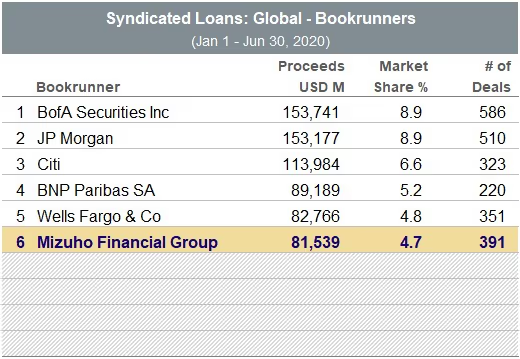
Structure of a Typical Syndicated Finance

- As an arranger, we negotiate terms and conditions with clients and secure syndicate lenders.
- As an agent, we oversee an array of administrative tasks, including processing loan applications, assigning loan portions, and disbursing principal and interest payments to other syndicate lenders on behalf of the customer.
Benefits of Syndicated Loans

One of Japan's Strongest Syndication Houses
As a leading bank in Japan, we're continuously ranked at the top of the league tables in the Japanese market with the best syndicated loan professionals and an excellent track record. We have accordingly built strong relationships with investors in Japan, including regional banks, trust banks and institutional investors.
Mizuho's Share of the Japan Syndicated Loan Market–Bookrunner (2020 H1)
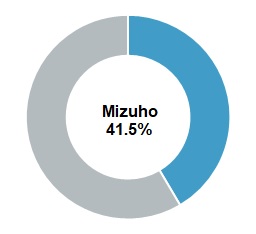
Notice
- The use of the above products or services is contingent upon the credit assessment in accordance with Mizuho Bank’s prescribed procedures. As part of this assessment, you may be required to submit certain documents.
- Commissions will be charged for the various services performed as the arranger or agent of a syndicated loan. Commission rates differ depending on the details of the syndication.
- Please consult an attorney, accountant, or tax accountant regarding any legal matters, accounting issues, or taxation concerns.
Acquisition Finance
Acquisition or leveraged finance is a financing arrangement that focuses on the value and future cash flows of an asset. Our leveraged finance team comprises experienced, multinational professionals located in Tokyo, New York, London, Hong Kong and Sydney. Our expertise in providing alternative solutions and navigating complex legal issues helps deliver the best possible outcomes for our clients.
Leveraged Buy–Out
LBO allows financial sponsors to take advantage of the global debt markets to raise funds to purchase a target company or part of its business with limited capital. The future cash flow of the acquired assets can be used to secure the debt. It may use a mixture of multiple ranked debt including senior debt, mezzanine debt and junior debt.
LBO can be applied to other types of financing such as a management buy–out (MBO) and can occur in growth situations, restructuring situations and insolvencies. We lead this market in terms of transaction volume.
Management Buy–Out
MBO allows the management team of a company to acquire all or part of the shares in the company through a new company established for that purpose.
Structure of a Typical MBO
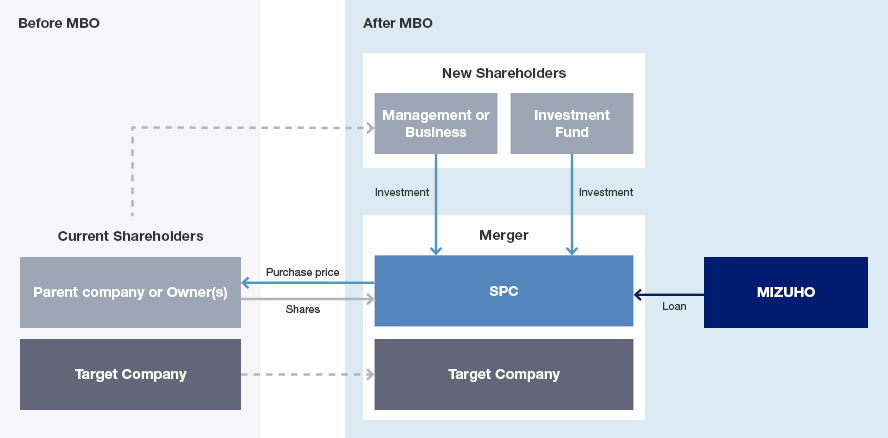
Mizuho Bank’s Activities
Proposing ways to optimize the business portfolio
- Proposing solutions such as business transfers, taking companies private and “spin–outs.”
Assisting with financing during the LBO/MBO process
- Introducing potential investors and making proposals regarding the structuring of deals and the various procedures to use when executing the transaction.
Offering support for business restructuring and revitalization
- Providing sophisticated financing solutions, including total debt restructuring, borrowing–base financing, and debtor–in–possession (DIP) financing.
Notice
The use of the above products or services is contingent upon the credit assessment in accordance with Mizuho Bank’s prescribed procedures. As part of this assessment, you may be required to submit certain documents.
Fees may be charged for using these products or services. The amount and type differ depending on the details of individual transactions.
Please consult an attorney, accountant, or tax accountant regarding any legal matters, accounting issues, or taxation concerns.
Real Estate Finance
Real estate finance can be used by property owners to optimize their balance sheets, as well as by REITs and other real estate businesses to acquire properties efficiently.
Real estate securitization refers to the process whereby income generated from real estate properties, and the value of the properties themselves, are used as collateral to secure a loan that is then used by a special purpose company (SPC) to purchase the properties.
We design financing proposals to meet the our clients’ specific needs based on the analysis of such factors as the property type, location, purchase price, occupancy rate, and related income versus expenditures.
Typical Structure of a Real Estate Securitization Arrangement

- The real estate owner (customer) agrees to sell their real estate to the SPC.
- The SPC obtains funds for the purchase in the form of a non–recourse loan and investment capital.
- The SPC pays the purchase price to the real estate owner (customer).
- The SPC uses the cash flows generated from the purchased properties to repay the loan and pay dividends to investors.
Addressing Other Business Needs
The securitization financial model helps real estate owners diversify financing methods and optimize their balance sheet. It could also be used by REITs, etc., to acquire real estate properties.
For those who need to consolidate or relocate their business centers, we provide simulations and cost estimates involved in such an action and suggest plans for effective alternatives. We also advise and provide optimal solutions for any real estate–related issues that may arise in the course of business development.
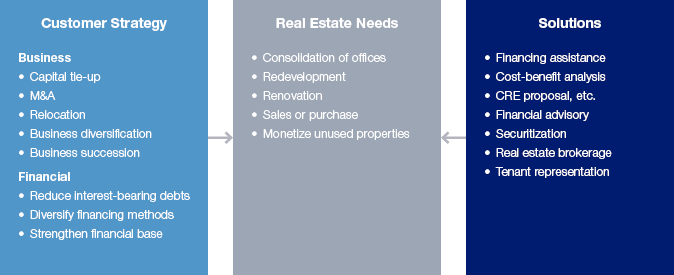
Notice
- The use of the above products or services is contingent upon the credit assessment in accordance with Mizuho Bank’s prescribed procedures. As part of this assessment, you may be required to submit certain documents.
- Fees may be charged for using these products or services. The amount and type differ depending on the details of individual transactions.
- Please consult an attorney, accountant, tax accountant, or auditing firm regarding any legal matters, accounting issues, or taxation concerns.
Project Finance
Project finance is a form of syndicated finance designed for long–term infrastructure and industrial projects often involving governments. We play a significant part in funding projects in various industrial sectors, catalyzing public and private partnerships and reducing project risk using a mix of government credits, insurance and private lending.
Global Project Finance
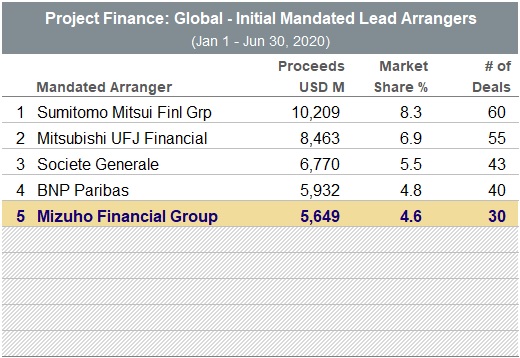
Structure of a Typical Project Financing Arrangement
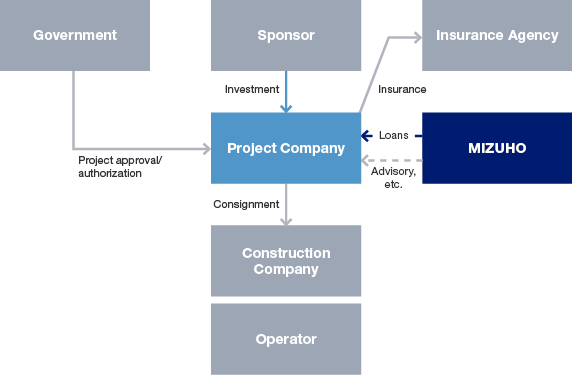
- The sponsor establishes and invests capital in the project company, which will serve as the borrower.
- The project company signs contracts with various parties involved in the project.
- The project company signs a loan agreement with the financial institutions, and borrows funds for the completion and operation of the project.
- The project company uses cash flows that are generated from the project to repay the loan.
Mizuho Bank’s Roles at Each Stage of Project Finance
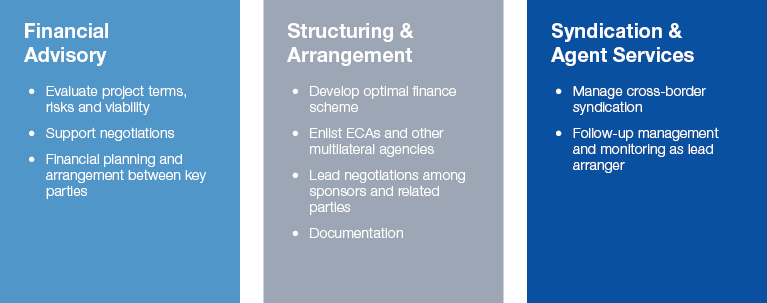
Equator Rules
We are a member of the Equator Principles Financial Institutions (EPFI), a group of 40 other major global private and governmental institutions that have established common standards that private financial institutions apply to determine, assess and manage environmental and social risks in project financing. The Equator Principles have been revised, reflecting the experience of the 40 member institutions.
Industry Sectors Covered
- Gas, Gas Pipeline, and LNG
- Oil, Petrochemicals
- Mining, Smelting
- Power Generation, Transmission, and Distribution
- Telecommunications, Information Technology
- Waste Treatment
- Highway, Railway, Port, Water, and Other Infrastructure
Notice
- The use of the above products or services is contingent upon the credit assessment in accordance with Mizuho Bank’s prescribed procedures. As part of this assessment, you may be required to submit certain documents.
- Fees may be charged for using these products or services.
- Please consult an attorney, accountant, or tax accountant regarding any legal matters, accounting issues, or taxation concerns.
Export Credit Agency Finance
An Export Credit Agency (ECA) is an institution that serves as an intermediary between governments and exporters, providing credit insurance or financial guarantees, or both, as part of a financing.
We have credentials and longstanding relationships with many of the major ECAs and with select Multilateral Finance Institutions (MFIs), which also operate to provide risk mitigation. We can provide our expertise to clients when structuring innovative financing solutions. Working alongside exporters and ECAs or MFIs, we can structure financings that mitigate exposure to so–called political risks, thereby facilitating exports to a potentially greater range of countries.
Our global footprint brings together a team of highly experienced professionals who work seamlessly to deliver cutting–edge solutions to clients worldwide. We have a proven track record providing ECA finance for our clients including buyer credits, overseas investment loans, untied loans, natural resource and energy loans.
Notice
- The use of the above products or services is contingent upon the credit assessment in accordance with Mizuho Bank’s prescribed procedures. As part of this assessment, you may be required to submit certain documents.
- Fees may be charged for using these products or services. The amount and type differ depending on the details of individual transactions.
- Please consult an attorney, accountant, tax accountant, or auditing firm regarding any legal matters, accounting issues, or taxation concerns.
Other Structured Finance
We serve you with innovative ideas and solutions for your corporate needs, drawing upon the expertise of our international branch networks and our experience in structuring sophisticated products.
- Securitization
- Lease
- Ship finance
- Aircraft finance
